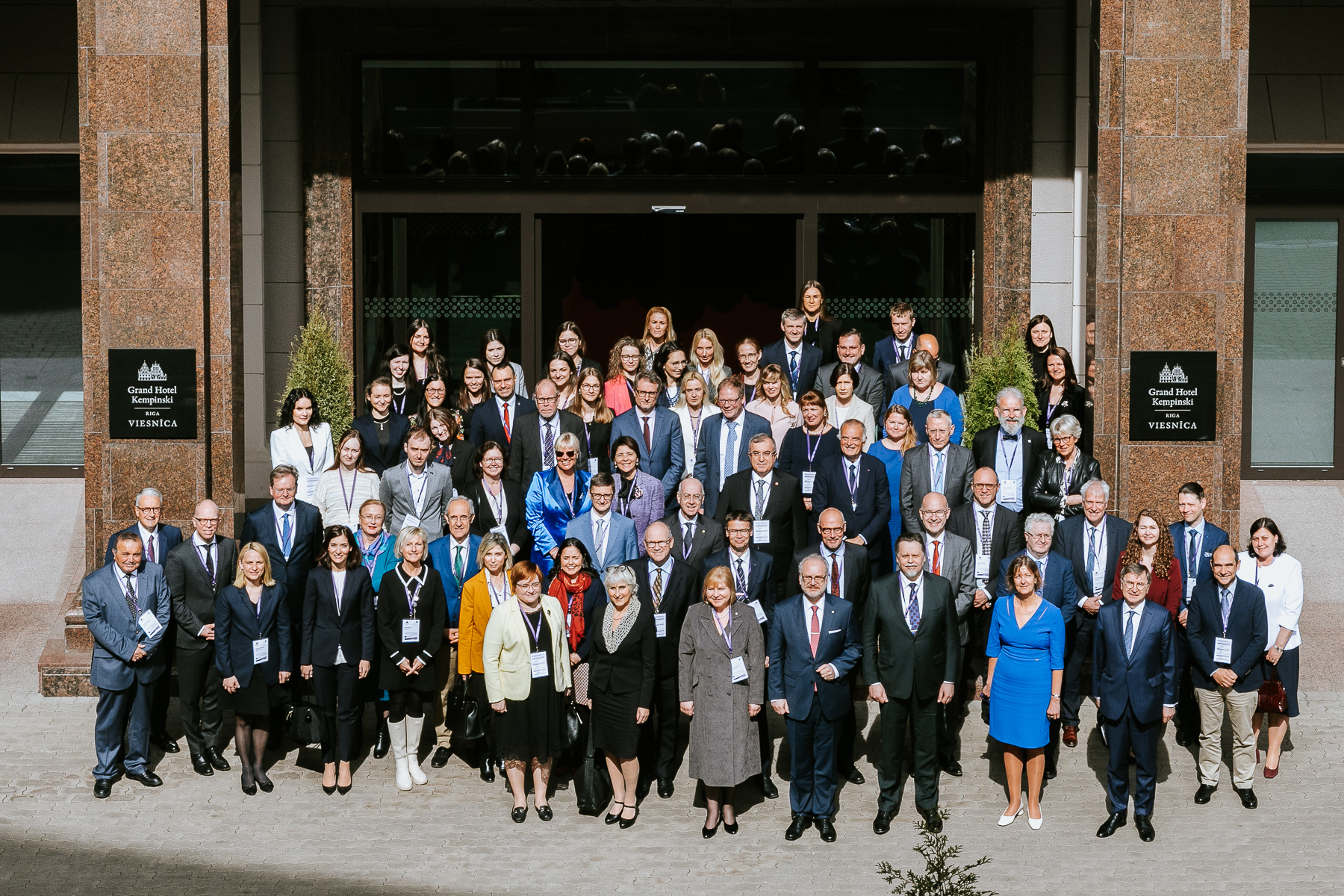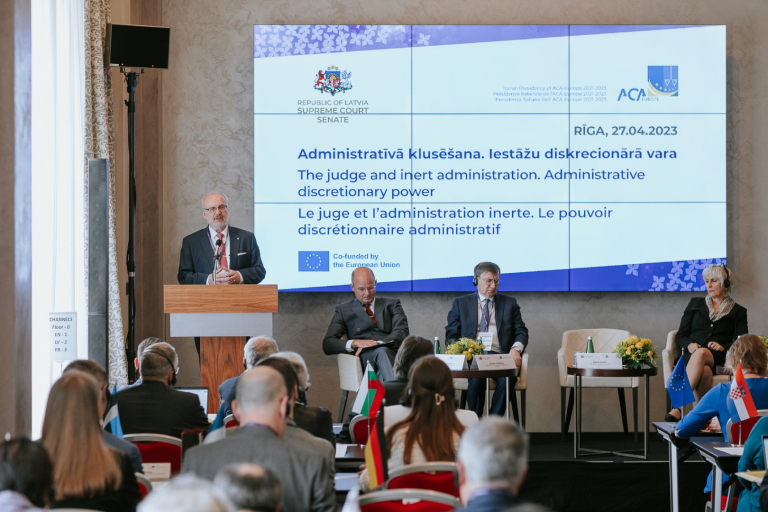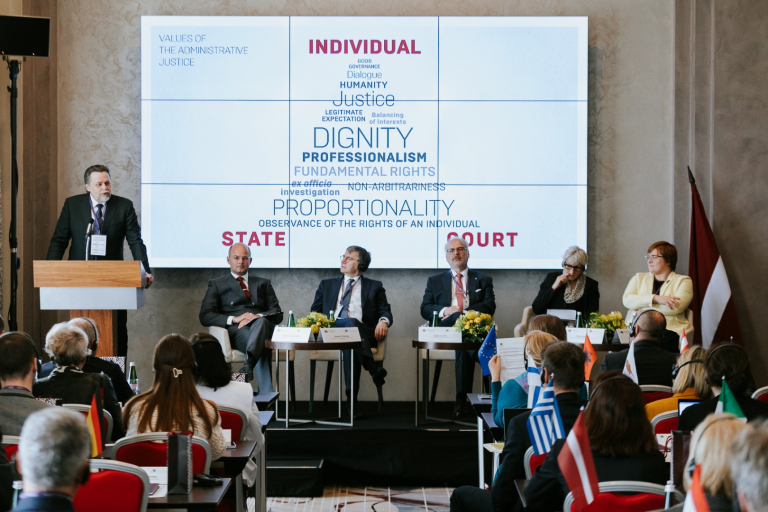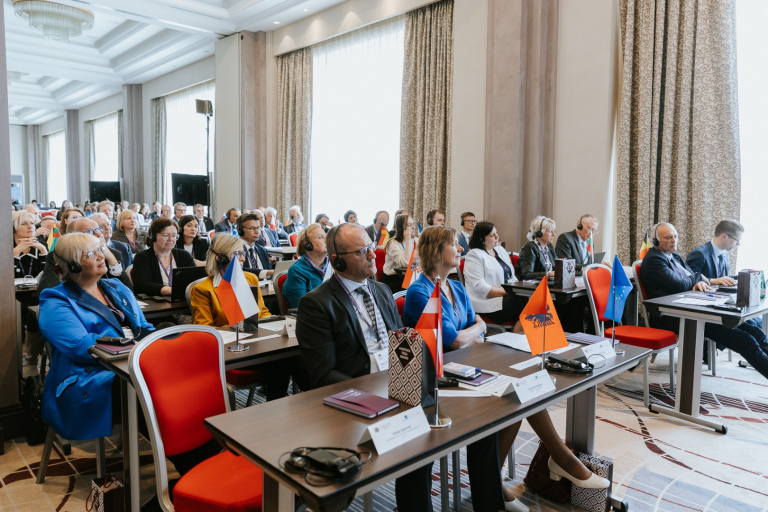Seminar ''The judge and inert administration. Administrative discretionary power'' organized by the Supreme Court in cooperation with the ACA-Europe held fruitfully
28. aprīlis, 2023.
On April 27, the seminar of the highest administrative courts of European countries titled "The judge and inert administration. Administrative discretionary power" was successfully held in Riga. It was organized by the Supreme Court of Latvia in cooperation with the Association of Councils of State and Supreme Administrative Jurisdictions of the European Union (ACA-Europe). Delegations from 28 ACA-Europe member states participated in the seminar.
At the opening session of the seminar, Egils Levits, the President of Latvia, addressed the participants emphasizing the role of administrative justice in protecting the values of a democratic state governed by the rule of law. The State President also explained how the development of the administrative procedure in Europe was impacted by the harsh lessons of history, and called on the participants of the seminar to reflect on the current challenges in the application of legal norms.
Aigars Strupišs, the President of the Supreme Court of Latvia, in his opening speech pointed out the essential importance of the court in ensuring the functions of state, emphasizing the special task of administrative courts – to ensure the effective protection of person’s rights that have been violated (A. Strupišs’ speech is available here).
The seminar was held in three panel discussions. The moderator of the first panel discussion of the seminar was assistant professor of the University of Latvia Dr. Edvīns Danovskis, and the rapporteurs were as follows:
- Dr. hab. Jacek Chlebny, President of the Supreme Administrative Court of Poland;
- Dr. Anna Sporrer, Vice President of the Supreme Administrative Court of Austria;
- Anita Kovaļevska, Senator of the Department of Administrative Cases of the Supreme Court of Latvia (Senate).
The discussion participants examined the views of the member states on the discretionary power of administrative authorities, the distinction between freedom of action and evaluation and the limits of judicial review. The discussion revealed a similar understanding the member states share on the nature of discretionary power. However, there was a varied understanding of the content of discretionary power, namely whether the authority's freedom of action in its narrowest sense and freedom of evaluation can be distinguished. Accordingly, differences in the extent of judicial review of the use of discretionary power by administrative authorities also took shape.
The State President also participated in the discussion on the use of the discretionary power by authorities. His view on the competence and tasks of administrative courts in the review of the decisions of authorities attracted broad interest of foreign colleagues.
The second and third panel discussions of the seminar were devoted to single topic – administrative silence, or the actions of authorities, when failing to decide on a person's application within the specified deadline.
The moderator of the second panel discussion was Laila Medina, Advocate General of the Court of Justice of the European Union. Rapporteurs on the concept of silence of public authorities were as follows:
- Luigi Carbone, Section President of the Italian Council of State;
- Dr. Barbara Pořízková, Vice President of the Supreme Administrative Court of the Czech Republic;
- Yves Gounin, State Counsellor of the French Council of State.
The third panel discussion of the seminar was moderated by Ieva Višķere, Senator of the Department of Administrative Cases of the Supreme Court of Latvia (Senate), and the rapporteurs were as follows:
- Dr. Suzana Maria Calvo Loureiro Tavares da Silva, Judge of the Supreme Administrative Court of Portugal;
- Iskra Alexandrova, Judge of the Supreme Court of Bulgaria;
- Eric Thibaut, Deputy Auditor General of the Belgian Council of State.
Within the framework of these panel discussions, it was emphasized that the silence of the authorities can lead to various legal consequences. Namely, the silence of the authorities can be considered as tacitly accepted rejection of the claim or silence can also be recognized as satisfaction of the claim. The discussion revealed that many common features can be found in the member states' understanding of the institute of institutional silence, however, the broader discussions arose precisely about the differences, namely the procedures for the protection of person’s rights in the event of the authority's silence and the authority's right to make a decision different from the one made in silence.
The ACA-Europe seminar organized in Riga plays an important role in the dialogue and cooperation among the highest administrative courts of European countries. The discussions raised within the seminar are a unique tool and an opportunity for member states to share their good practice and positive experience in order to improve and develop the performance of administrative courts in Europe. The Supreme Court is honoured for having the opportunity to hold such a large-scale seminar and is pleased with the course of the seminar and its results.
A more detailed information of the seminar and a reflection of the reports of the panel discussion participants will be published on the ACA-Europe website https://aca-europe.eu/index.php/en/, as well as in the next issue of the Supreme Court Bulletin. It should also be reminded that the materials related to the course of the seminar are available to all interested parties on the ACA-Europe website, namely the survey prepared by the Supreme Court of Latvia containing questions on the topic of the seminar, the answers provided by the member states, as well as the General Report prepared by the Supreme Court.
Information prepared by the Department of Administrative Cases of the Supreme Court
Additional information: Communication Division of the Supreme Court
Telephone: 67020396; e-mail: baiba.kataja@at.gov.lv





